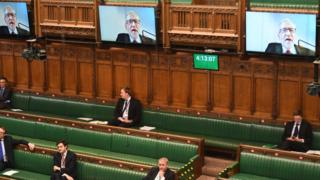 Image copyright
JESSICA TAYLOR/UK PARLIAMENT
Image copyright
JESSICA TAYLOR/UK PARLIAMENT
MPs will be required to vote in person after Parliament returns this week under a plan tabled by Jacob Rees-Mogg.
The Commons leader wants to replace a temporary online voting system with a new method of physical voting that respects social distancing rules.
The usual practice of voting in corridors - called division lobbies - has been ruled unsafe by Commons Speaker Sir Lindsay Hoyle.
But opposition MPs say returning would be irresponsible and put them at risk.
In a letter to MPs last week, Mr Rees-Mogg said voting in the division lobbies would be replaced by a "more appropriate alternative".
He has tabled a motion which requires MPs to be physically present in Parliament to be able to vote after MPs return from their Whitsun recess on Tuesday.
It does not specify a system to replace voting in the lobbies, noting that votes - called divisions - should be held "under arrangements made by the Speaker".
MPs have been voting digitally as part of arrangements allowing them to work on a semi-virtual basis during the coronavirus pandemic.
The set-up has seen a maximum of 50 MPs allowed in the Commons chamber, with up to 120 taking part via video conferencing technology.
Mr Rees-Mogg wants to return to physical working from Tuesday, arguing that virtual working was not an effective way to hold the government to account.
The cross-party procedure committee has tabled a rival plan under which the Speaker would be authorised to carry on with electronic voting.
The plan, contained in a series of amendments, has received the backing of a number of Conservative MPs, including select committee chairs Simon Hoare, Julian Knight and Sir Bob Neill.
'Much more effective'
Writing for the Politics Home website, Mr Rees-Mogg said the virtual set-up "is no longer necessary," and physical working would make the Commons "much more effective".
"Politics is better done face-to-face, even if the whites of the ministerial eyes are six feet away," he added.
He also said work was underway with Commons authorities to determine how MPs shielding at home or with health conditions "can safely continue to contribute".
It is understood the government sees the pairing convention - under which absent MPs from opposing parties have their votes cancelled out - as a way to account for MPs who are not able to vote in person.
In a report published on Saturday, the procedure committee said alternative plans to allow MPs to vote in person could see them cast their votes by walking either side of the Speaker's chair in the Commons chamber.
Parliamentary officials - known as clerks - would record their names via cameras trained on the chamber floor.
However it dismissed the idea as having "significant practical deficiencies," with a socially-distanced queue snaking 800m outside the chamber if all MPs took part.
It estimated that voting in such a way would take half an hour rather than the usual 15 minutes.
'Discriminatory' plans
Instead the committee suggested a hybrid system, with some MPs voting in person and others via computer.
Shadow Commons leader Valerie Vaz said Labour said all MPs should be able to "participate on an equal basis," and would vote in favour of remote voting continuing.
She said government plans to scrap digital votes would be "discriminatory" and "result in two classes of MPs," with some forced to stay away for health reasons.
Getting rid of semi-virtual working, she added, was "discriminatory and would not be acceptable in any other workplace".
'Toothless Parliament'
Among those criticising plans to scrap digital voting was Labour's Dame Margaret Hodge, who said it had been working "perfectly well".
The 75-year-old MP for Barking in east London, who is in the "vulnerable" category to the virus, said she was "being denied the right to vote".
"This damaging move will limit accountability and create a toothless Parliament," she added.
Liberal Democrat Jamie Stone, who cares for his wife, said the plan tabled by Mr Rees-Mogg would endanger the safety of his loved ones.
"You're asking me to choose between the health of my family and abiding by your poxy stubbornness," he tweeted.
"I choose to fulfil my duties as a husband and family man."
The Prospect union, which represents some parliamentary staff, also criticised the decision to end virtual working, calling it "premature and unnecessary".
Its deputy general secretary Garry Graham said MPs deserved to see "evidence in writing" from Public Health England that the plans to making them return to Westminster are safe.